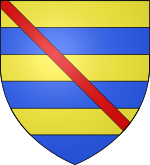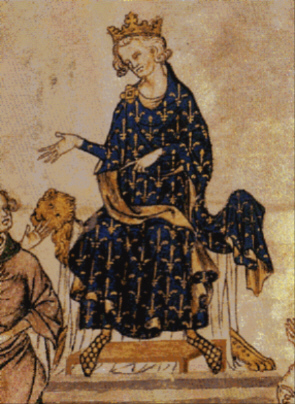
Philip VI, called the Fortunate, the Catholic and of Valois, was the first king of France from the House of Valois, reigning from 1328 until his death in 1350. Philip's reign was dominated by the consequences of a succession dispute. When King Charles IV of France died in 1328, his nearest male relative was his sororal nephew, Edward III of England, but the French nobility preferred Charles's paternal cousin, Philip of Valois.
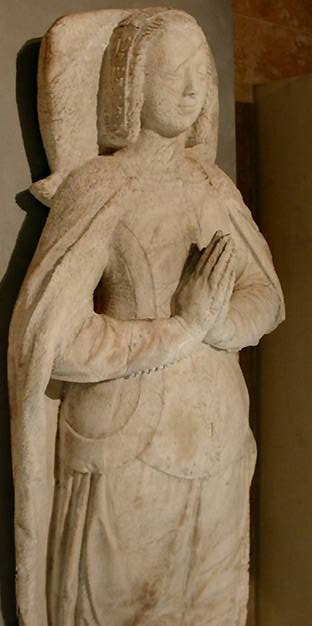
Joan of Penthièvre reigned as Duchess of Brittany together with her husband, Charles of Blois, between 1341 and 1364. Her ducal claims were contested by the House of Montfort, which prevailed only after an extensive civil war, the War of the Breton Succession. After the war, Joan remained titular Duchess of Brittany to her death. She was Countess of Penthièvre in her own right throughout her life.
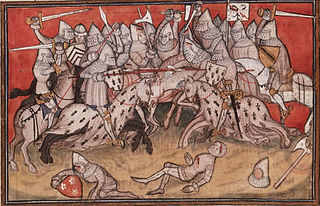
The War of the Breton Succession was a conflict between the Counts of Blois and the Montforts of Brittany for control of the Sovereign Duchy of Brittany, then a fief of the Kingdom of France. It was fought between 1341 and 12 April 1365. It is also known as the War of the Two Jeannes due to the involvement of two rival duchesses of that name.

John IV the Conqueror KG, was Duke of Brittany and Count of Montfort from 1345 until his death and 7th Earl of Richmond from 1372 until his death.

Sir James Audley, KG was one of the original knights, or founders, of the Order of the Garter. He was the eldest son of Sir James Audley of Audley in Staffordshire.

Sir Robert Knolles or Knollys was an English knight of the Hundred Years' War, who, operating with the tacit support of the crown, succeeded in taking the only two major French cities, other than Calais and Poitiers, to fall to Edward III. His methods, however, earned him infamy as a freebooter and a ravager: the ruined gables of burned buildings came to be known as "Knollys' mitres".
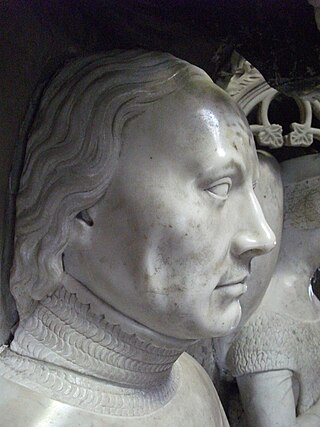
Olivier V de Clisson, nicknamed "The Butcher", was a Breton soldier, the son of Olivier IV de Clisson. His father had been put to death by the French in 1343 on the suspicion of having willingly given up the city of Vannes to the English.
The Battle of Mauron was fought in 1352 in Brittany during the Breton War of Succession between an Anglo-Breton force supporting the claim of Jean de Montfort and a Franco-Breton force supporting the claim of Charles de Blois. The Anglo-Bretons were victorious. The battle took place in the context of the Hundred Years War.

The battle of Morlaix was fought near the village of Lanmeur in Brittany on 30 September 1342 between an Anglo-Breton army and a far larger Franco-Breton force. England, at war with France since 1337 in the Hundred Years' War, had sided with John of Montfort's faction in the Breton Civil War shortly after it broke out in 1341. The French were supporting Charles of Blois, a nephew of the French king.
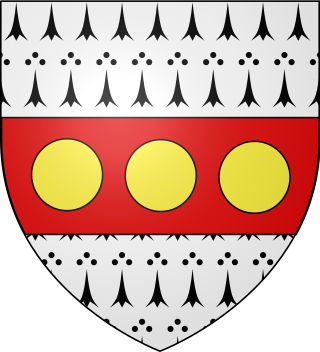
Sir Thomas Dagworth was an English knight and soldier, who led the joint English-Breton armies in Brittany during the Hundred Years' War.
The siege of Brest took place in 1342 during the Breton Civil War. When the Duke of Brittany died childless in 1341 the title was contested by Charles of Blois and John of Montfort. Charles was the nephew of the French king, Philip VI, who supported him with a large army. Charles invaded Brittany, making good progress and taking John prisoner. John's wife, Joanna of Flanders, took up the Montfortist cause and fought on. As France and England had been fighting the Hundred Years' War since 1337 Joanna appealed to Edward III, the English king, for military assistance, which was promised.

The initial campaign of the Breton Civil War took place in 1341 when a French royal army intervened in a dynastic dispute between two claimants to the Duchy of Brittany. Brittany was a province of France, but although the dukes of Brittany were vassals of the French kings they governed the duchy as independent rulers. When John III, Duke of Brittany, died on 30 April 1341, title to the duchy was claimed by both his niece, Joan of Penthièvre, and his younger half-brother, John of Montfort. Joan's claim was exercised through her husband, Charles of Blois, a nephew of the King of France, Philip VI. A complicating factor was the ongoing Hundred Years' War between France and England that had broken out in 1337. A truce was in place which was due to expire in June 1341 but was extended to June 1342.
Events from the 1350s in England.

The Battle of Pontvallain, part of the Hundred Years' War, took place in the Sarthe region of north-west France on 4 December 1370, when a French army under Bertrand du Guesclin heavily defeated an English force which had broken away from an army commanded by Sir Robert Knolles. The French numbered 5,200 men, and the English force was approximately the same size.

Jeanne de Clisson (1300–1359), also known as Jeanne de Belleville and the Lioness of Brittany, was a French/Breton noblewoman who became a privateer to avenge her husband after he was executed for treason by King Philip VI of France. She crossed the English Channel targeting French ships and often slaughtering their crew. It was her practice to leave at least one sailor alive to carry her message of vengeance.

The sieges of Vannes of 1342 were a series of four sieges of the town of Vannes that occurred throughout 1342. Two rival claimants to the Duchy of Brittany, John of Montfort and Charles of Blois, competed for Vannes throughout this civil war from 1341 to 1365. The successive sieges ruined Vannes and its surrounding countryside. Vannes was eventually sold off in a truce between England and France, signed in January 1343 in Malestroit. Saved by an appeal of Pope Clement VI, Vannes remained in the hands of its own rulers, but ultimately resided under English control from September 1343 till the end of the war in 1365.
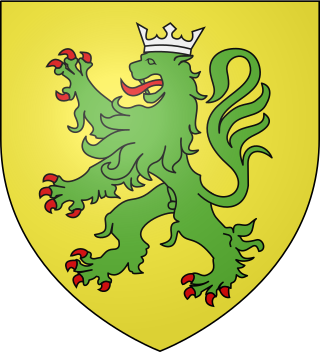
Robert VIII Bertrand de Bricquebec, also known as Robert Bertrand, Baron of Bricquebec, Viscount of Roncheville, was a 14th century Norman noble. He served as Marshal of France from 1325 until 1344.

Raoul de Caours was a Breton knight who served both the English and French during the Hundred Years' War.
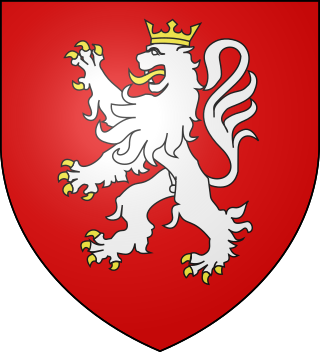
Olivier IV de Clisson, was a Breton Marche Lord and knight who became embroiled in the intrigue of Vannes and was subsequently executed by the King of France for perceived treason. He was the husband of Jeanne de Clisson who eventually became known as the Lioness of Brittany.

Amaury de Clisson (1304–1347), was a Breton knight who became the chief emissary for Jeanne de Penthièvre to the court of Edward III of England.
